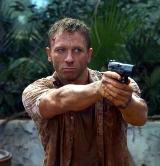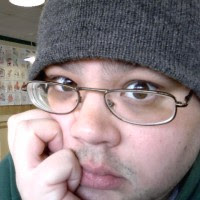 300: As much as I enjoyed Sin City, something that kept me from absolutely loving it is that it was almost too reverential - especially in terms of the script - to the original comic books. 300 is most definitely inspired by Frank Miller's storytelling, but Zack Snyder doesn't just re-create it on film; he expands upon it, both in terms of character development (especially with Lena Headey's subplot) and action. Gerard Butler (a Mis Hooz favorite) built himself into a frickin' linebacker to play Leonidas, and is a much richer character - bold, arrogant, inspirational, and even somewhat vulnerable - on screen than in print. What I love most about 300 is that it's wholly unapologetic and absolutely confident about its violence and mythologized fantasy, much like the Spartan king.
300: As much as I enjoyed Sin City, something that kept me from absolutely loving it is that it was almost too reverential - especially in terms of the script - to the original comic books. 300 is most definitely inspired by Frank Miller's storytelling, but Zack Snyder doesn't just re-create it on film; he expands upon it, both in terms of character development (especially with Lena Headey's subplot) and action. Gerard Butler (a Mis Hooz favorite) built himself into a frickin' linebacker to play Leonidas, and is a much richer character - bold, arrogant, inspirational, and even somewhat vulnerable - on screen than in print. What I love most about 300 is that it's wholly unapologetic and absolutely confident about its violence and mythologized fantasy, much like the Spartan king.
(Yet the Spartans and their $128 million worth of box office after two weeks still haven't pushed the Projection Booth Pervs out of first place in the Follywood Fantasy Movie League last week, baby! This is where I stand! This is where I fight! A-whoo! A-whoo! A-whoo!)
Zodiac: Something about this film is really amazing, because you basically know how the story ends and what ultimately happens to the protagonist (without whom there wouldn't have been the books that the script is based on), and a good two-thirds of the movie is detectives, sheriffs, reporters, suspects, and witnesses sitting around talking, yet the whole thing still managed to captivate me for almost three hours. A big reason the movie was so compelling is the fantastic collection of actors (especially Robert Downey, Jr. and Mark Ruffalo), although Jake Gyllenhaal seemed a bit miscast to me, even if he was suitably wide-eyed and age-appropriate. Another interesting aspect of the story to me is that it doesn't just occupy itself with the case, but also references its wider cultural impact with movies like Dirty Harry, for instance. One thing that bothered me, however, was that the film essentially seems to decide who the Zodiac Killer is, though I suppose that's consistent with the source material used for the movie.
Breach: In some ways, maybe this is the film Zodiac should've been, though it's not really a fair comparison, as one case was something of a cultural phenomenon, while the other was more infamously historic. But what I mean is that Breach kept a tighter focus on the Robert Hanssen case itself, mostly following the people immediately involved, rather than widening its scope to look at its ripple effects. Actually, that's pretty similar to how the same director, Billy Ray, approached the Stephen Glass story in Shattered Glass. I've read some reviews that wanted the story to explain why Hanssen felt the need to sell secrets to the Russians, but I think that information is already in the movie, particularly in Chris Cooper's portrayal of an embittered lifelong employee who feels overqualified and woefully underappreciated. Casino Royale: This film had to be made, because we should not be living in a world where Matt Damon (as Jason Bourne) should be a cooler, more bad-ass super-spy than James Bond. Comic books frequently go back to the source material (with varying degrees of success and credibility), looking for the basic traits of what made a character so appealing in the first place, and that's what happened here. I thought Daniel Craig was a great choice for the role from the start, and right away, he gave Bond an edge and energy (and fallibility) that makes him a far more compelling character than the martini-sipping caricature he'd become over the past 20 years. The foot chase at the beginning of the movie - with running, jumping, sliding, and shooting not enhanced by CGI - might have been the best action scene in any movie last year.
Casino Royale: This film had to be made, because we should not be living in a world where Matt Damon (as Jason Bourne) should be a cooler, more bad-ass super-spy than James Bond. Comic books frequently go back to the source material (with varying degrees of success and credibility), looking for the basic traits of what made a character so appealing in the first place, and that's what happened here. I thought Daniel Craig was a great choice for the role from the start, and right away, he gave Bond an edge and energy (and fallibility) that makes him a far more compelling character than the martini-sipping caricature he'd become over the past 20 years. The foot chase at the beginning of the movie - with running, jumping, sliding, and shooting not enhanced by CGI - might have been the best action scene in any movie last year.
Stranger than Fiction: Okay, I never got around to doing so a couple of months ago, so let me say it now: this was the best damn movie I saw last year. The premise - a guy who realizes he's the main character of someone's novel and about to be killed off - is something that could easily fall apart or become terribly goofy as it tries to explain itself, but it somehow holds together here, and I think that's because the filmmakers don't try to explain anything. This is how it is, so let's just tell a really smart, funny story, make it poignant by populating it with the most interesting, believable characters we can create, and cast actors - Will Ferrell, Maggie Gyllenhaal, Emma Thompson, Dustin Hoffman - who will make you give a damn about all of it. It works as a character study, it works as a straight romance, it even works as an analysis of what makes great literature (although that might not be the movie's strongest point).
Monday, March 19, 2007
The Return of Four-Sentence Movie Reviews!
Posted by
Ian C.
at
3:30 PM
![]()
Labels: four-sentence movie reviews, movies
Subscribe to:













